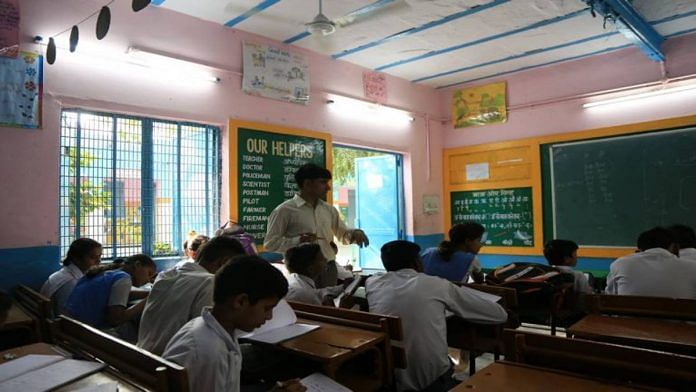New Delhi: Between narrating tales of patriotic valour and teaching students about mindfulness, government school teacher Sant Ram is struggling to complete the Class 7 Hindi curriculum on time for the mid-term exams, which are right around the corner.
According to Sant Ram, who works at the Delhi government-run Sarvodaya Bal Vidyalaya in Subhash Nagar, there simply isn’t enough time for core subjects like Hindi, English, and maths.
This is because schools are also required to teach the Deshbhakti (patriotism) Curriculum, which was launched last year, and Happiness Curriculum, introduced in 2018. For students of classes 11-12, there’s also the Entrepreneurship Mindset Curriculum (EMC), which started in 2019.
While these educational initiatives by the Delhi government have been designed for well-rounded learning and to ease academic pressure on students, they seem to have put some teachers in a tough position.
“Classes 3-9 have to have a 45-minute period each for Happiness and Deshbhakti classes. Out of the eight periods that we have every day, two are always earmarked for these subjects,” a teacher at a government school in Dilshad Garden said on condition of anonymity.
Happiness classes include activities and stories that encourage mindfulness and self-expression, while the Deshbhakti curriculum aims to instil national pride and a sense of duty through storytelling and discussions.
“We would like if the frequency or time of these periods is reduced so that we can teach the children coursework instead,” the teacher added.
Until then, some schools have devised temporary solutions. “My school is cutting down on sports/PE and Sanskrit periods in order to accommodate these additional subjects,” Sant Ram, who has been a teacher for 20 years, said. But even then, finishing the syllabus of core subjects ahead of mid-terms has been tough.
According to the new assessment guidelines of the Directorate of Education (DoE), in the academic session 2022-23, the mid-term examination will be conducted in September/October and the Common Annual School Examination (CASE) in February/March.
These new guidelines, issued in July, also stipulate that students will now be assessed for the impact of the Happiness, Deshbhakti, and EMC courses on their behaviour, along with other scholastic subjects.
ThePrint contact DoE director Himanshu Gupta over texts and calls for a comment, but no response was received.
Also read: Do Delhi parents agree with govt teaching ‘deshbhakti’ to kids in schools? This survey answers
MCD teachers breathing a little easier
Schools run by the central-government-aided Municipal Corporation of Delhi (MCD) are slightly less overwhelmed than their counterparts when it comes to managing additional subjects along with regular classroom work.
One simple reasons is that most of the 1,530 schools managed by the MCD are only for classes 1 to 5, where the difficulty and size of the curriculum is less.
Meenakshi Yadav, a teacher at a civic school in Rohini, said that classes 1 and 2 have only three subjects each, which made it easier to incorporate classes on patriotism and happiness. “The only struggle was with Class 5, which has five subjects, but even for them the course content will be covered by the time mid-term exams are conducted.”
Vibha Singh, president of the MCD Teachers Association, said: “The MCD has made a separate 20-minute slot for the morning when students have prayers and activities based on the Happiness Curriculum. This is done to ensure that time is saved for study.”
(Edited by Asavari Singh)
Also read: To be happy, be an adult: The new lesson for children in Delhi schools



